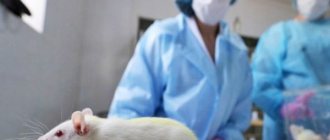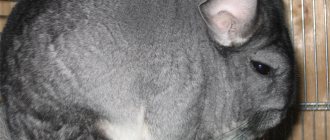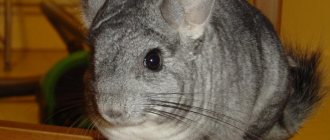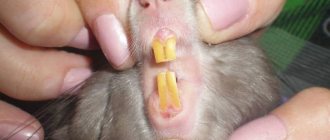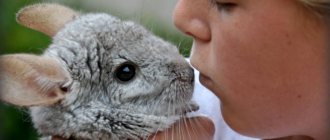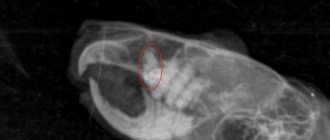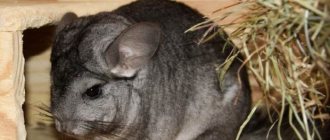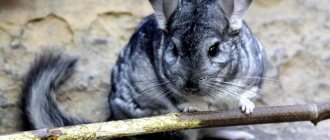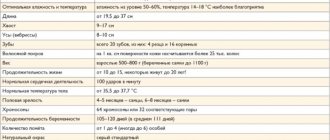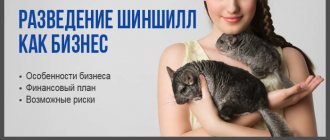- home
- Chinchillas
- Castration of chinchillas
| Service | Price |
| Castration of chinchillas | from 3000 rub. |
In captivity, chinchillas live up to 10 years. Puberty in a young individual begins at 5-7 months. The hormonal surge affects the pet’s behavior - it becomes irritable and aggressive. High excitability of the nervous system occurs every 3-4 months.
Why is chinchilla castration necessary?
This surgical operation has the following advantages:
The level of aggressiveness of the rodent decreases - since it no longer feels the desire to reproduce.
It becomes possible to control reproduction - there is no need to care for the born offspring.
The animal stops marking territories with its urine - you can forever forget about the unpleasant smell from the cage.
The risk of developing pathologies of the genitourinary system is reduced.
A pet lives much longer.
In addition, after castration, you can keep a large number of pets of different sexes in one cage.
Basic methods of castration
Currently, such procedures can be carried out both in clinical and at home settings.
Typically, such surgical operations are performed in several ways:
Closed bloody - during such an operation, 2 incisions are made on the animal’s body, which provides unhindered access to its reproductive organs.
The main disadvantage of this method is its increased traumatism, which significantly complicates wound healing (more than 14 days).
Open bloody - during the castration process there is no severe injury to the rodent, and the wounds heal within a week.
The main disadvantage of this procedure is the high risk associated with prolapse of the omentum and intestines.
During the operation, only one incision is made, which ensures a high rate of wound healing and eliminates the possibility of complications.
What is it for
Quite often, furry owners wonder whether it is necessary to castrate and sterilize chinchillas at all, or whether it is better to do without surgery. In fact, the decision is made individually. However, most veterinarians are in favor of surgery, and for the following reasons:
- The pet becomes more flexible . The chinchilla shows more affection towards its owner. And most importantly, aggression associated with mating games during mating is eliminated. In general, the pet feels calmer and more satisfied.
- Fuzzies stop leaving marks . As a result, the apartment will be completely free of the smell of urine.
- There is no need to care for a pregnant female and offspring , which will later have to be placed in good hands. As a rule, chinchillas are in demand. However, there are situations when some babies “stay too long” next to their mother.
- Fluffy's life expectancy increases . On average, neutered chinchillas live 3-5 years longer.
- The risk of developing diseases of the kidneys, bladder and reproductive system is reduced . Including malignant neoplasms.
- Dental problems disappear . In particular, the enamel is strengthened, which is important for rodents who are accustomed to testing everything.
As you can see, castration and sterilization procedures not only solve the issue of birth control for puppies, but also generally have a beneficial effect on the health of chinchillas.
Features of the surgical operation
During the castration process, intramuscular or gas anesthesia is used. Usually this procedure takes no more than half an hour.
After anesthesia is administered, the pet is fixed in a supine position and then the hair is removed from the desired area.
Next, the surgeon makes a small incision on the scrotum of the male, about 1.5 cm, and about 5 cm on the abdomen of the female.
Then the doctor removes the testicles in males and the uterus and ovaries in females.
Finally, sutures are placed at the incision site, which are removed by a veterinarian after the wound has healed (about 10 days). Moreover, sutures applied with self-absorbing threads do not need to be removed at all.
Rehabilitation after castration
In order for your pet to recover from anesthesia as quickly as possible, it is necessary to create extremely comfortable conditions for it.
In particular, you will need to place a soft diaper and a warm heating pad in the rodent's cage. Such measures are necessary to warm the animal after anesthesia.
It is also necessary to treat the seam especially carefully, otherwise inflammation and suppuration will inevitably occur in this place, which can significantly increase the healing time of the wound.
In addition, to prevent your pet from becoming infected, you should clean its cage as often as possible. After the chinchilla recovers from anesthesia, you can begin to feed and water it.
Until the rodent's swallowing reflex is completely restored, it is necessary to drink water and feed boiled vegetables in the form of a puree from a pipette.
After 2 days, the animal can be given the usual solid food.
It is worth noting that, unlike other rodents, chinchillas recover well and quickly from anesthesia, so their rehabilitation process proceeds without any special problems.
The pros and cons of castration and sterilization
It would seem that all the advantages listed above should encourage all chinchilla owners to carry out appropriate operations. However, everything is not so simple. Castration and sterilization have one significant drawback. The fact is that although these are short-term, they are still operations that are performed under anesthesia.
And chinchillas are quite small animals, for which only an experienced specialist can calculate the correct dose. Therefore, there is always a risk that the fluffy simply will not recover from anesthesia. It is for this reason that many caring owners choose not to undergo surgery.
The greater the animal's weight, the greater the chance that the pet will tolerate anesthesia well. Therefore, before the operation, it is advisable to “fatten” the animal to at least 500 g.
Among the disadvantages of castration and sterilization there is also a high likelihood of animals gaining excess weight. However, most experts consider such accusations to be unfounded. If you follow a rational diet, your chinchilla will definitely not be overweight. In addition, furry animals are herbivores, and there is simply no way for them to become obese. You won't gain much weight on hay, fruits and vegetables.
Behavior change
After castration, chinchillas become more balanced, calm and friendly. Their mood stabilizes and their mental state normalizes.
They get along well with new cagemates and can reproduce without the risk of unwanted offspring.
Contrary to popular belief, animals do not experience an increase in body weight after surgery; on the contrary, weight normalization is noted.
Most breeders claim that after this procedure, the dental condition of furry pets improves, and it is also much easier to care for them.
Preparing an animal for castration
Any surgical intervention requires preliminary preparation. First, a specialist examines the animal to determine whether it has any contraindications for surgery. One of them may be animal intolerance to anesthesia.
If no such contraindications are found, the specialist will set a time and day for the operation. The animal is not given food for several hours before surgery.
If the animal has not received certain vaccinations, then they must be done in advance of the operation.
If the need arises, antiparasitic treatment must be carried out.
The main advantages of surgery at home
Such simple operations can be carried out both in the clinic and directly at the pet owner’s home.
Castration at home is currently considered one of the most popular services for the following reasons:
- Carrying out the operation at home provides the most comfortable conditions for the animal and significantly shortens the rehabilitation period.
- There is no need to transport the animal to the veterinary hospital and back, which will not only save on transportation costs, but also protect it from unnecessary stress.
- The veterinarian has the opportunity to perform the operation at any time, both on weekdays and on weekends.
- There is no need to stand in long lines at the veterinary hospital, risking contracting some infectious disease.
- The specialist brings with him all the tools and medications needed for castration.
- The cost of this procedure, performed at home, is practically no different from a similar operation performed in a clinic.
- A specialist can give a lot of useful advice related to caring for an animal during the postoperative period.
The veterinarian leaves full contact information to the breeder, so if any problems arise, just call the doctor by phone, and he will arrive at any time of the day.
General services
| Prices for services in our clinic | In the clinic and at home |
| Ratologist visiting your home | from 500 |
| Clinical examination, preliminary diagnosis, consultation | from 500 |
| Telephone consultation | for free |
| Therapy | from 150 |
| Surgery | from 150 |
| Ambulance at home (within an hour) | from 1000 |
Therapy
| Prices for services in our clinic | In the clinic and at home |
| Subcutaneous administration of drugs to rodents | from 150 |
| Intramuscular administration of drugs to rodents | from 200 |
| Intravenous (into a catheter, through a needle) | from 200 |
| Dropper for rodents | from 1000 |
| Placement of an intravenous catheter | from 300 |
| Removing the IV catheter | 200 |
| Tube feeding of rodents | from 300 |
| Taking blood samples | from 300 |
| Novocaine blockade | from 200 |
| Reduction of the cheek pouch | from 200 |
| A haircut | |
| Nail trimming | from 300 |
| Haircutting mats | from 1000 |
| Ear treatment | from 300 |
Surgery and Traumatology
| Prices for services in our clinic | In the clinic and at home |
| Surgery | |
| Surgery of the genitourinary organs in rodents: | |
| Castration | from 2000 |
| Sterilization | from 2500 |
| Surgical procedures | from 400 |
| Surgical treatment of wounds | from 300 |
| Application of musculocutaneous sutures | from 200 |
| Applying a bandage | from 100 |
| Applying a plaster cast | from 1000 |
| Removing the plaster cast | from 300 |
| Surgery for skin, soft tissue and tumor infections | |
| Opening abscesses, hematomas | from 400 |
| Treatment of purulent wounds | from 700 |
| Drainage installation | from 500 |
| Flushing the drainage | 350 |
| Treatment of auricular hematoma | from 1500 |
| Unilateral mastectomy | from 4000 |
| Regional mastectomy | from 5000 |
| Removal of tumors | from 2000 |
| Abdominal surgery | |
| Obstetrics in rodents | from 1000 |
| Animation of newborns | from 300 |
| C-section | from 3000 |
| Pyometra | from 1500 |
Anesthesiology for rodents
| Prices for services in our clinic | In the clinic and at home |
| Anesthesia | from 500 |
Ophthalmology
| Prices for services in our clinic | In the clinic and at home |
| Eyelid surgery for inversion, eversion | from 2000 |
| Exenteration of the eyeball | from 3000 |
Dentistry
| Prices for services in our clinic | In the clinic and at home |
| Removal of incisors | from 500 |
| Trimming and correction of teeth in rodents | from 1500 |
Laboratory diagnostics
| Prices for services in our clinic | In the clinic and at home |
| Blood analysis: | |
| General clinical blood test | 900 |
| Blood cytology | 1000 |
| Biochemical analysis for 1 sample indicator | 300 |
| Biochemical blood test for 6 indicators | 1500 |
| Biochemical blood test for 12 indicators | 2500 |
| Additional biochemical indicators for pancreatic amylase, rheumatoid factor, c-reactive protein | from 300 |
| Analysis of urine: | |
| General clinical urine analysis | 400 |
| Express urine glucose test | 200 |
| Express urine test | 300 |
| Biochemistry of urine 1 indicator | 100 |
| Stool examinations | |
| General stool analysis | 500 |
| Stool culture for pathogens | 1500 |
| Stool analysis for dysbacteriosis | 2000 |
| Stool analysis for protozoa and helminth eggs | 500 |
| Bacteriology | |
| Bacteriological screening | 2000 |
| Microbiological screening | 2000 |
| Full microbiological screening (no subtitration) | 1500 |
| Skin studies | |
| Skin biopsy | 1700 |
| Skin smear | 1000 |
| Dermatophytes and ectoparasites | 1000 |
| Pathomorphology | 1500 |
| Histology of neoplasms, cystic contents | 2000 |
| Cytology of neoplasms, cystic contents | 1500 |
In what cases is it necessary to do
Sometimes castration is a vital measure to save the life of an animal. The operation is mandatory for the following medical indications:
- testicular and prostate cancer;
- ovarian tumors;
- Caesarean section operation.
In the latter situation, the female does not need to undergo castration. However, then you will have to carefully ensure that the male does not cover her. Otherwise, pregnancy with a 99.9% probability will end in the death of the animal and offspring.
